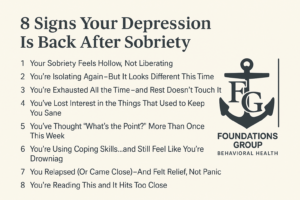There’s a strange kind of pain that comes with feeling low again after a long stretch of doing better. Maybe you made it 90 days. Maybe 9 months. You worked hard. You held it together. And then—somewhere in the quiet—something shifted.
It’s not that you’ve “fallen off.” You’re still showing up. You still know the right things to do. But inside? It’s starting to feel like you’re running out of steam. Like hope has gotten quieter. Like you’re wondering if you’re just destined to feel this heavy.
If you’re a person in recovery wondering whether your depression is back—or whether it ever fully left—this list isn’t here to judge. It’s here to name the silent signs that many in your shoes carry without saying out loud.
At Foundations Group Behavioral Health, we work with alumni every week who feel this way. They aren’t starting over. They’re building a next chapter—with the support they need now.
1. Your Sobriety Feels Hollow, Not Liberating
You’re staying clean. People might even be proud of you. But inside, it doesn’t feel like a win. It feels like a grind.
One outpatient client described it this way:
“It’s like I’m doing all the right things, but none of them are touching the sadness underneath.”
When sobriety becomes mechanical—just going through the motions—it’s often because something deeper is asking for attention. Depression treatment can help surface and soothe those underlying emotional wounds without threatening your recovery.
2. You’re Isolating Again—But It Looks Different This Time
You still text back. You might still make meetings. But there’s a growing pull toward silence. You stay home more. You answer questions with “I’m fine.” You avoid eye contact when someone asks how you really are.
This isn’t the same isolation you had in active use. This is a quieter withdrawal—the kind that even you might not notice until the loneliness becomes overwhelming.
Depression loves disconnection. Treatment offers a bridge back to meaningful connection, even if you’re not ready for big group shares or heart-to-hearts.
3. You’re Exhausted All the Time—and Rest Doesn’t Touch It
This isn’t just tired. It’s bone-deep fatigue. Like you’re dragging yourself through the day, one small obligation at a time.
Depression-related fatigue can feel like your body is constantly in “low power mode.” You’re technically functioning, but it’s costing you everything.
You might start skipping meals. Showering less. Avoiding sunlight. It happens slowly. Depression treatment can help rebuild energy by addressing what’s draining you from the inside out—not just asking you to “push through.”
4. You’ve Lost Interest in the Things That Used to Keep You Sane
Remember how art, nature, music, or journaling used to help? Now it all feels…dull. You try, but nothing lands. You go through the motions, but there’s no spark.
This symptom—anhedonia—is often one of the clearest markers of depression.
When your favorite things stop feeling like anything, it’s time to let someone know. Depression treatment isn’t about “cheering you up.” It’s about helping your brain and body get back to a place where pleasure is possible again.
5. You’ve Thought “What’s the Point?” More Than Once This Week
Let’s be clear: this doesn’t have to mean suicidal ideation. (Though if it does, please reach out now—there’s urgent help available.)
But even vague thoughts like, “Why does it matter if I’m sober?” or “No one would care if I disappeared,” are signals of emotional pain worth responding to.
These thoughts often don’t show up until you’re too worn down to push them away. But the sooner you name them, the sooner we can work with them—not against them.
6. You’re Using Coping Skills…and Still Feel Like You’re Drowning
You’ve meditated. You’ve walked. You’ve gone to a meeting. You’ve used your tools.
But nothing is sticking. That’s not failure. That’s a signal that you’ve hit a threshold where your existing support system needs reinforcement.
Depression treatment can feel like adding scaffolding to a structure that’s already strong—but strained. You built something solid. Now let’s help it last.
7. You Relapsed (Or Came Close)—And Felt Relief, Not Panic
This one hurts to admit. But it’s real. When using or drinking starts to feel like a relief instead of a mistake, something important is breaking down.
That doesn’t make you weak. It means your emotional pain is louder than your recovery tools—and that’s what depression does.
You’re not bad. You’re not back at square one. But you are allowed to get help. Depression treatment in Falmouth, MA and Barnstable County is available through Foundations—and we won’t meet you with shame. Just solutions.
8. You’re Reading This and It Hits Too Close
Maybe you didn’t expect to relate to this list. Maybe you were just browsing.
But if something inside you said yes—even quietly—it’s worth listening to. Not every depression looks the same. And not every relapse starts with a drink. Some start with disconnection. Exhaustion. Numbness.
If any part of you feels seen here, that’s enough to reach out. You don’t need to prove your suffering to qualify for care.
FAQs About Depression Treatment After Recovery
Is this relapse or depression—or both?
Sometimes it’s hard to tell. Depression and relapse can overlap, especially when emotional pain goes untreated. A professional can help you separate the threads—and respond to both.
Will I be judged for relapsing or feeling low?
No. At Foundations, we view relapse as a human experience—not a moral failure. And depression is something to treat, not something to hide.
What if I don’t want to do residential treatment again?
You don’t have to. Our outpatient depression treatment programs are designed to support recovery and mental health without requiring you to step away from daily life.
Can I get help even if I’m not actively using?
Absolutely. In fact, many of our alumni return for support during emotionally difficult times—even if they’ve technically “stayed sober.” You’re welcome at any point on your path.
What does depression treatment actually involve?
It usually includes therapy (like CBT or trauma-informed care), psychiatric evaluation (if needed), and supportive structures that help regulate mood and motivation. Your treatment plan will reflect your specific goals and needs.
This Isn’t the End of Your Story
Relapse doesn’t erase the work you’ve done. And depression doesn’t mean you’ve failed. It means you’re still human, still feeling, still worth showing up for.
Foundations Group Behavioral Health is here for that middle space—when you’re not at a full crisis, but you’re not okay either.
Call 888-685-9730 or visit our Depression treatment program in Cape Cod, MA to learn more. You don’t have to do this alone.









